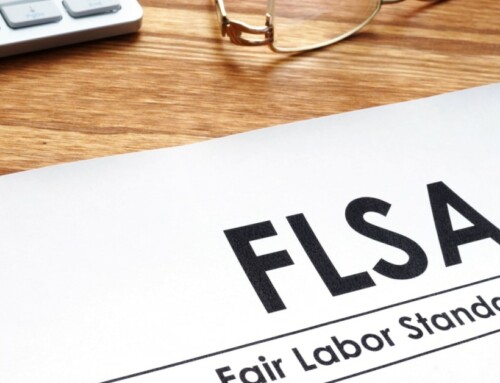The U.S. Food and Drug Administration (FDA) granted full approval for the Pfizer-BioNTech COVID-19 vaccine on August 23, 2021. As several media outlets have reported, this approval will likely lead to more widespread acceptance of the vaccine. For many employers, this may enhance the desirability and feasibility of imposing vaccine mandates.
Before imposing COVID-19 vaccine mandates, however, employers must address the attendant legal risks. While vaccine mandates are legal, generally speaking, flaws in the implementation of mandatory vaccine programs can expose employers to liability under the Americans with Disabilities Act (ADA) and other statutes.
Employer Vaccine Mandates are Permissible Under Federal Law
As we have discussed previously, vaccine mandates are permissible under federal law. While the South Carolina Senate passed a bill in April 2021 prohibiting certain employers from disciplining or firing employees who refuse to get vaccinated, the bill has since stalled.
The U.S. Equal Employment Opportunity Commission (EEOC) states that employers can require COVID-19 vaccination for all employees, “provided certain requirements are met.” With regard to the ADA specifically, the EEOC further states:
“[A]n employer may require an individual with a disability to meet a qualification standard applied to all employees, such as a safety-related standard requiring COVID-19 vaccination, if the standard is job-related and consistent with business necessity. Suppose a particular employee cannot meet such a safety-related qualification standard because of a disability. In that case, the employer may not require compliance for that employee unless it can demonstrate that the individual would pose a ‘direct threat’ to the health or safety of the employee or others in the workplace.”
The EEOC defines a “direct threat” to health or safety as a “‘significant risk of substantial harm’ that cannot be eliminated or reduced by reasonable accommodation.” In order to assess whether an employee’s non-compliance with a mandatory COVID-19 vaccine requirement constitutes a “direct threat,” the EEOC instructs employers to consider the following factors:
- The duration of the risk;
- The nature and severity of the potential harm;
- The likelihood that the potential harm will occur; and,
- The imminence of the potential harm.
The EEOC notes that potential reasonable accommodations for employees who are unable to comply with vaccination requirements due to disabilities include masking, working staggered shifts, teleworking “if feasible,” or making changes to the employees’ work environments or work assignments. However, the Commission also notes that “[t]he determination that a particular employee poses a direct threat should be based on a reasonable medical judgment that relies on the most current medical knowledge about COVID-19”—meaning that it is ultimately left to employers to decide whether any particular accommodation is adequate to allow non-compliance with a company-wide vaccination requirement on a case-by-case basis.
Example Considerations for Adopting a Mandatory COVID-19 Vaccination Policy
Given the risk of employment-related litigation arising out of mandatory COVID-19 vaccination policies, there are several considerations that South Carolina employers should address before implementing these policies. Some examples of these considerations include:
Development of the Company’s Mandatory COVID-19 Vaccination Policy
Employers must carefully develop their mandatory COVID-19 vaccination policies. These should not be cookie-cutter policies but instead, custom-tailored documents that address the unique aspects of each employer’s workforce, operations, facilities, and risks. Mandatory COVID-19 vaccination policies should also specifically address the requirements and restrictions imposed by the ADA, Title VII of the Civil Rights Act of 1964, and all other pertinent laws.
Non-Discriminatory Exceptions to Mandatory Vaccination
In some cases, employers may choose to offer exceptions to mandatory vaccination affirmatively. For example, some employers may not require vaccination for employees who work remotely. While these types of exceptions can be permissible, employers must be cautious to ensure that any exceptions are not discriminatory in their purpose or effect (i.e., disproportionately disadvantaging a protected class of employees).
Procedures for Receiving and Evaluating Requests for Reasonable Accommodations
Employers must also adopt procedures for receiving and evaluating employees’ requests for reasonable accommodations (as alternatives to COVID-19 vaccination). All companies should have documented means for employees to submit requests, and they should have step-by-step procedures for evaluating requests in a timely, consistent, and non-discriminatory manner. These steps should include engaging the company’s employment law counsel as necessary—as it is highly likely that questions regarding how to handle employees’ accommodation requests will arise frequently.
Internal Communications to Employees
In light of today’s highly politicized environment and the significant amount of misinformation about COVID-19 vaccines circulating online, companies will also be extremely important to deliver precise and consistent messaging regarding their mandatory vaccination policies.
While full approval of the Pfizer-BioNTech vaccine may assuage some employees’ concerns, others will still have firmly held beliefs that run counter to the company’s goal of providing a safe environment for its employees and customers. With this in mind, company leaders should think carefully about whether and how to provide public justification for their mandatory vaccination policies. They should proactively prepare for questions and complaints.
Risks of Not Mandating COVID-19 Vaccination for Employees
Due to the challenges involved with implementing a mandatory COVID-19 vaccination policy, some employers may consider not moving forward with implementation. However, before making this decision, company leaders must consider its implications as well. If the company chooses not to mandate vaccination (or take other appropriate precautions) and employees get sick at work, will the company be exposed to legal liability? This is a possibility, and it is an area where we expect to see a significant amount of litigation in the years to come.
Speak with a South Carolina Employment Attorney at Gignilliat, Savitz & Bettis, LLP
At Gignilliat, Savitz & Bettis, LLP, we have been helping South Carolina employers make informed decisions and protect their interests in litigation for more than 50 years. If you have questions about adopting a mandatory COVID-19 vaccination policy, we encourage you to get in touch. To schedule an appointment with one of our South Carolina employment attorneys, please call 803-799-9311 or inquire online today.






